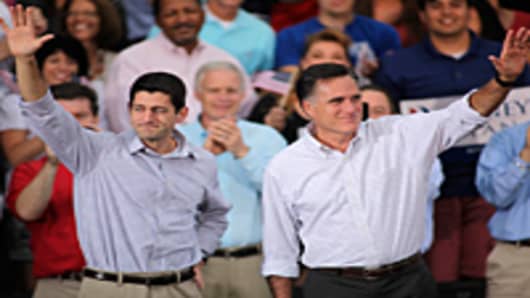Wall Street's reaction to Paul Ryan's place on the presidential ticket may well depend on Main Street's response — namely, whether the Wisconsin congressman can help Mitt Romney win the election.
Chatter around the financial markets Sunday and Monday indicated a dichotomy: Investment pros almost unanimously like the firebrand vice presidential nominee, but they're not as sure that he'll help the Republicans unseat President Obama.
With so much of the Street's money flowing to Romney, the stakes in him getting elected are huge.
"The whole election has been transformed overnight. Instead of focusing on Barack Obama's mediocre performance on the economy, the election now may be a referendum on the Paul Ryan budget," said Greg Valliere, chief political strategist at Potomac Research Group in Washington. "The Paul Ryan budget polls very poorly."
Valliere worries that while the message of fiscal responsibility is a positive one, the timing may not be right for someone as aggressively reform-minded as Ryan.
"The most important development is that this pick makes it unlikely that Romney can win Florida because of the anxiety Ryan generates among senior citizens over Medicare," he added. "If Romney can't win Florida, he can't win the presidency."
That could be troubling for the financial world, which, according to the most recent figures from the Center for Responsive Politics, has given twice as much in donations to Romney as Obama.
That the Ryan planboth has bipartisan support and would not affect anyone currently on Medicare or within 10 years of retirement age may not matter if the White House political machine can scare voters into thinking the program won't be there when they retire.
"I fully agree that we need to have an adult conversation on entitlements," Valliere said. "But just looking at the Electoral College map, this is very risky."
Or, as another strategist working for a major firm, speaking on condition of anonymity, more succinctly stated, "When all is said and done, does this help the Republican ticket?
"They're fascinated by this," the strategist said of Wall Street chatter over Ryan. "Their view is this is the most brilliant election move ever and will put him over the top, or it will be Palinesque," a reference to 2008 GOP nominee John McCain's ultimately disastrous selection of then-Alaska Gov. Sarah Palin for the No. 2 slot on the ticket.
Dennis Gartman, a hedge fund manager and author of the widely followed Gartman Letter, put himself in the brilliant-selection camp, even though he was rooting for former Secretary of State Condoleezza Rice.
Calling Ryan "the rare individual with absolute mastery of the vastness of the US budget" and said Ryan's fiscal conservatism and desire to reform Washington's reckless spending "may actually resonate with younger voters who now see these programs as assaults upon their own future, fiscal well-being."
But there were concerns that stretched beyond Medicare.
Nomura Securities economist Lewis Alexander said the Ryan nominationsends a message that a Romney administration would be aggressive in attacking issues surrounding the "fiscal cliff," Federal Reserve Chairman Ben Bernanke's term for the slew of tax increases and spending cuts that will take place automatically in 2013 if Congress does not reach deficit-reduction targets.
"This choice, and its impact on the content of the campaign, is likely to reinforce political support for fiscal consolidation. This suggests that the policy debates that will come after the election may generate a more front-loaded fiscal consolidation than previously expected," Alexander said in a note to clients.
"Both of these factors may be a headwind for risky assets in coming months," he added. "In effect, with this choice concerns about the 'fiscal cliff' may affect markets somewhat sooner than we had earlier thought.
The stock marketsold off Monday morning, though the losses were attributed primarily to yet more evidence of global economic slowing.
Still, Morgan Stanley chief strategist Adam S. Parker recently said the summer stock market rally, of which he is suspect, may have been driven by pricing in a Romney victory.
So was Monday's slump a retracement of that move?
Intrade, a website where investors can put money on expected outcomes of various events, moved only marginally to the Romney side following the Ryan announcement, still giving Obama a 58 percent likelihood of re-election.
The election, of course, remains three months away, so Romney backers in the financial markets are far from conceding anything to the president.
Gartman praised Romney for a selection that signaled his "intention of moving the campaign along toward serious budgetary and business considerations."
"Wisconsin is not a 'swing state,'" Gartman observed in analyzing the political calculus of the choice. "Rather, Mr. Ryan was chosen for his budget acumen, and this we think quite wise."
Questions? Comments? Email us at NetNet@cnbc.com
Follow Jeff @ twitter.com/JeffCoxCNBCcom
Follow NetNet on Twitter @ twitter.com/CNBCnetnet
Facebook us @ www.facebook.com/NetNetCNBC



